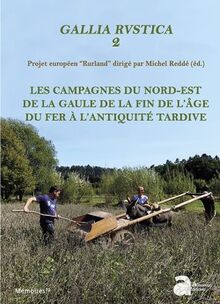
Le premier volume de Gallia Rustica était consacré aux études régionales sur les campagnes du nord-est de la Gaule, entre le bassin de la Seine et la frontière de Germanie. Cette recherche, financée par l'European Research Council (ERC), ouvre ici, dans ce deuxième volet de la publication finale, sur une synthèse générale des données acquises à l'occasion de cette vaste enquête collective. On y examine successivement l'évolution des établissements ruraux, depuis la fin de l'âge du Fer jusqu'à l'Antiquité tardive, le système agro-pastoral, les parcellaires, mais aussi le fonctionnement économique des campagnes gauloises, avec ses fluctuations dans le temps, le rôle des marchés, à l'échelle d'une vaste région qui constitue, au sens large, l'hinterland d'une des plus importantes frontières de l'Empire. Cette réflexion globale et pluridisciplinaire clôt ainsi le programme Rurland, mais en aucune manière la recherche sur un monde rural que l'enquête a révélé fort varié, bien différent des clichés traditionnels qui ont longtemps marqué notre réflexion sur ce processus complexe et controversé qu'on appelle la « romanisation » des provinces.
The first volume of Gallia Rustica was devoted to regional studies on the countryside of northeastern Gaul, between the Seine basin and the German limes. In this second volume of the final publication, this research, funded by the European Research Council (ERC), leads to a general synthesis of data acquired during this vast collective survey. It addresses successively the evolution of rural settlements, from the end of the Iron Age to late antiquity ; the agro-pastoral system ; field boundaries ; but also the economic functioning of the Gallic countryside, with its fluctuations over time ; the role of markets. These topics are studied accross a vast region that forms, in the broad sense, the hinterland of one of the Empire's most important frontiers. This global and multidisciplinary enquiry brings the Rurland programme to an end. At the same time, it stimulates further research on ancient rural societies. Indeed, the survey has showed the Gallic countryside to be very varied and very different from traditional clichés that have long marked our thinking on the complex and controversial process known as the « romanization » of the provinces.